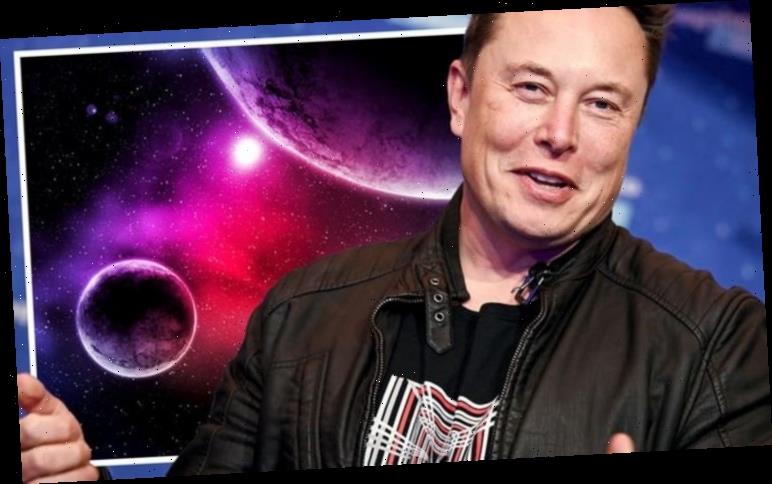Elon Musk surpasses Bezos as ‘world’s richest person’
Elon Musk, the controversial SpaceX and Tesla head – and world’s richest person – has doubled-down on his ambitious timeline to get to Mars. In a two hour interview, the SpaceX boss revealed his hopes of establishing “a self-sustaining civilisation, or a least a self-sustaining city” on the Red Planet ad he insisted humans needed to evolve to become a “multi planetary” species.
Mr Musk told Good Time Show hosts Sriram Krishnan and Aarthi Ramamurthy it would take him “five and a half years [to reach Mars].”
There is the possibility to take life beyond Earth and to make life multi-planetary
Elon Musk
The SpaceX head also detailed the origins of his long-standing fascination with space exploration.
He said: “I had an existential crisis who I was a kid. What’s the meaning of life, why are we here, what’s the point of it all, is it all meaningless?
“The book that brought me out of it was Douglas Adams’ ‘Hitchhikers Guide to the Galaxy’, where he essentially pointed-out the Universe is the answer – the point is to ask what questions you ask about the answer that is the Universe.
We will use your email address only for sending you newsletters. Please see our Privacy Notice for details of your data protection rights.
“The answer is the easy part, the questions are the hard part. In order to understand what it is all about, we have to increase the scope and scale of consciousness, so we are better able to figure out which questions to ask.”
Elon Musk then explained why he has such strong hopes humans will eventually become a multi-planet species.
He said: “I wouldn’t be surprised if out there in our galaxy and others, there are a whole bunch of dead one-planet civilisations that prospered for a white – perhaps for millions of years – but then gradually experienced a civilisation collapse for reasons external or internal. And that was that.
“All civilisations go through an arc, where they build ever-more complex technology. But this doesn’t keep going up and at a time, they decline and fall.
“This has happened, obviously if you are a student of history, to many civilisations in the past.
“You can look at ancient Egypt – 5,000 years ago there was the Great Pyramid of Giza, then the people forget how to build pyramids or read hieroglyphics after a while.
“There was the decline handful of the Roman Empire, where they had advanced in terms of technology, such as aqueducts and planning and so forth – and then they sort of forgot about it.
“The ancient Sumerians, the Babylonians – all these civilisations have all gone through a similar arc.
DON’T MISS…
Einstein time travel theory boosted with ‘path to past’ found [REPORT]
Space weather forecast: Solar winds expected to hit Earth next week [FORECAST]
‘Asteroid’ 2020 SO mini-moon set to make close approach to Earth [INSIGHT]
“This all suggests that we will go through a similar such arc ourselves. And I believe we will be less resilient to recovery because of globalisation.”
The two hour long audio-only Clubhouse app interview also saw Mr Musk outline the source of his optimism for migrating life to other worlds.
He said: “For the first time in the four and half billion years of Earth, there is the possibility to accept life beyond Earth and to make life multi-planetary.
“And this window of opportunity may be open for a long time or it may be open for a short time.
“I think it is wise for us to assume the window will be open for a short time.
“I am an optimist, not a pessimist, but you have to say there is some chance it will be open only for a short time.
“We need to take advantage of this brief window of opening to transport life and make life multi-planetary.”
He added how motivation for doing this could be in the event of an apocalyptic event, saying: “I think we also have an obligation to ensure that creature of Earth continue, even if there is a collapse here on Earth.
“And this could be manmade or it could be some sort of natural calamity.
“If you look at the fossil record, there have been many such mass extinctions.”
The interview also saw the SpaceX head briefly touch upon the vision he holds for human civilisation on Mars.
He said: “I would not like to presume what should happen there.
“I think the important part is to get there and establish a self-sustaining civilisation, or a least a self-sustaining city.
“I think the key threshold when we pass this particular great culture is whether Mars is sufficiently self-sustaining that if the ships stop coming from Earth for any reason – it could be because of something massive or something banal – does Mars die out now?”
Source: Read Full Article




